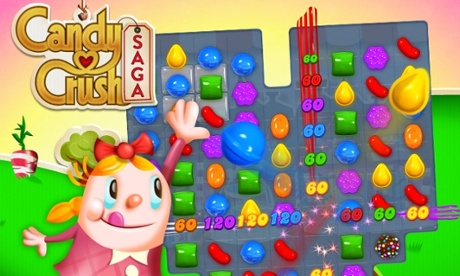
The company behind the phenomenally addictive Candy Crush Saga game is set to join the New York Stock Exchange in a sale that could value it at $5.5bn.
King Digital Entertainment said Tuesday it plans to raise $500m from an initial public offering on the NYSE. As part of its filing to go public, King revealed the massive scale of its customers’ sweet addiction.
The game, which involves matching brightly coloured sweets on a grid to solve various puzzles, was played over 1bn times a day in December, according to the filing. Candy Crush is free but players pay for options within the game. It has proved a lucrative combination.
King’s profits grew over 7,000% last year, according to the filing. In 2012 the company’s revenues were $164.4m and its net profit $7.8m, in 2013 those figures rose to $1.88bn and $567.6m respectively.
But the filing also reveals that King’s fortunes are currently closely tied to the continued success of Candy Crush. The game accounts for 78% of Kings total gross bookings, according to the filing. Its second most popular game, Pet Rescue Saga, had 15m daily active users in December, a fraction of Candy Crush’s 93m. King noted in its filing that “a small number of games currently generate a substantial majority of our revenue.”
“If the gross bookings of our top games, including Candy Crush Saga, are lower than anticipated and we are unable to broaden our portfolio of games or increase gross bookings from those games, we will not be able to maintain or grow our revenue, and our financial results could be adversely affected,” the company said.
Investors may also be concerned about a dip in King’s quarterly revenues from $621.2m in the third quarter of 2013 to $601.7m in the fourth quarter, as its number of monthly unique payers (MUPs) fell from 13m to 12.2m as a result of “the seasoning of our older games in certain markets among our more occasional customers” according to King.
The company, which was founded in 2002 as Midasplayer.com, initially made its name from skill-based web games before moving into Facebook social games in 2011 and then mobile games in 2012.
Going public will be a lucrative affair for the company’s founders: it has only raised $9m of funding since it was founded in 2002 and its founders and early backers retain significant stakes. According to the filing King’s shares were worth $45.61 as of December – suggesting a value in excess of $5.5bn given the number of shares outstanding. The final valuation is likely to be higher.
Chief executive Riccardo Zacconi could pocket more than $500m (£300m) from his 10% holding in the firm, which he co-founded. Largest shareholder Apax Partners could see a return of over $2bn from its 45% stake.
The company has recently been in the news for criticism of its approach to trademark filings, and suggestions that several of its games have copied older titles. Last week Albert Ransom, developer of a similar game called Candy Swipe, released two years before Candy Crush, accused King of using US trademark law to destroy his company.
The sale comes amid signs of a new boom in IPOs and investments in tech firms. So far this year, some 31 companies have sold their shares to the public for the first time, a 72% increase from this point in 2013, according to Renaissance Capital.
Last year Finland’s Supercell, the company behind the Clash of Clans and Hay Day games franchises, raised $1.5bn from Japan’s Softbank in a deal that valued it at around $3bn.
Marcos Sanchez, vice president at App Annie, an analyst specialising in the mobile market, said King dominated the charts in terms of revenues. “There are not a ton of blockbuster hits,” he said. “It’s not like you get a million of these types of games, just a handful a year have the staying power.”
He said King had successfully managed to integrate purchases that were “not too in your face” into a game that was compelling enough to keep people coming back. “King cracked that code,” he said. The challenge now would be to keep people coming back while bringing in new players, he said.
“It’s the bubble-time mentality in my opinion,” said Alan Patrick, co-founder of technology consultancy Broadsight, “Anyone with a hope of an IPO will try and shoot through the gate before it closes.”
The history of Zynga, the last big games company to go public, is likely to lead to some tough questions for King as it faces analysts. Zynga, maker of Words With Friends, FarmVille and other viral hits, went public in 2011. Its share price has almost halved since then, as investors have fretted about its games becoming stale.
It’s an issue King acknowledges in its filing: “Our continued growth will depend on our ability to regularly develop new games and enhance our existing games in ways that improve the gaming experience for both paying and non-paying players while encouraging the purchase of virtual items within our games,” said the company.
Bank of America, Merrill Lynch, Credit Suisse and JP Morgan Chase are leading the underwriting of the IPO.

